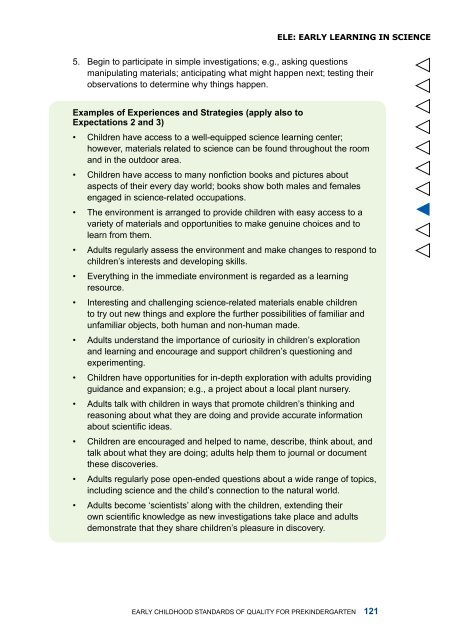Early Childhood Standards of Quality for ... - State of Michigan
Early Childhood Standards of Quality for ... - State of Michigan
Early Childhood Standards of Quality for ... - State of Michigan
Create successful ePaper yourself
Turn your PDF publications into a flip-book with our unique Google optimized e-Paper software.
ELE: EARLY Learning IN SCIENCE5. Begin to participate in simple investigations; e.g., asking questionsmanipulating materials; anticipating what might happen next; testing theirobservations to determine why things happen.Examples <strong>of</strong> Experiences and Strategies (apply also toExpectations 2 and 3)• Children have access to a well-equipped science learning center;however, materials related to science can be found throughout the roomand in the outdoor area.• Children have access to many nonfiction books and pictures aboutaspects <strong>of</strong> their every day world; books show both males and femalesengaged in science-related occupations.• The environment is arranged to provide children with easy access to avariety <strong>of</strong> materials and opportunities to make genuine choices and tolearn from them.• Adults regularly assess the environment and make changes to respond tochildren’s interests and developing skills.• Everything in the immediate environment is regarded as a learningresource.• Interesting and challenging science-related materials enable childrento try out new things and explore the further possibilities <strong>of</strong> familiar andunfamiliar objects, both human and non-human made.• Adults understand the importance <strong>of</strong> curiosity in children’s explorationand learning and encourage and support children’s questioning andexperimenting.• Children have opportunities <strong>for</strong> in-depth exploration with adults providingguidance and expansion; e.g., a project about a local plant nursery.• Adults talk with children in ways that promote children’s thinking andreasoning about what they are doing and provide accurate in<strong>for</strong>mationabout scientific ideas.• Children are encouraged and helped to name, describe, think about, andtalk about what they are doing; adults help them to journal or documentthese discoveries.• Adults regularly pose open-ended questions about a wide range <strong>of</strong> topics,including science and the child’s connection to the natural world.• Adults become ‘scientists’ along with the children, extending theirown scientific knowledge as new investigations take place and adultsdemonstrate that they share children’s pleasure in discovery.<strong>Early</strong> <strong>Childhood</strong> <strong>Standards</strong> <strong>of</strong> <strong>Quality</strong> <strong>for</strong> Prekindergarten 121


